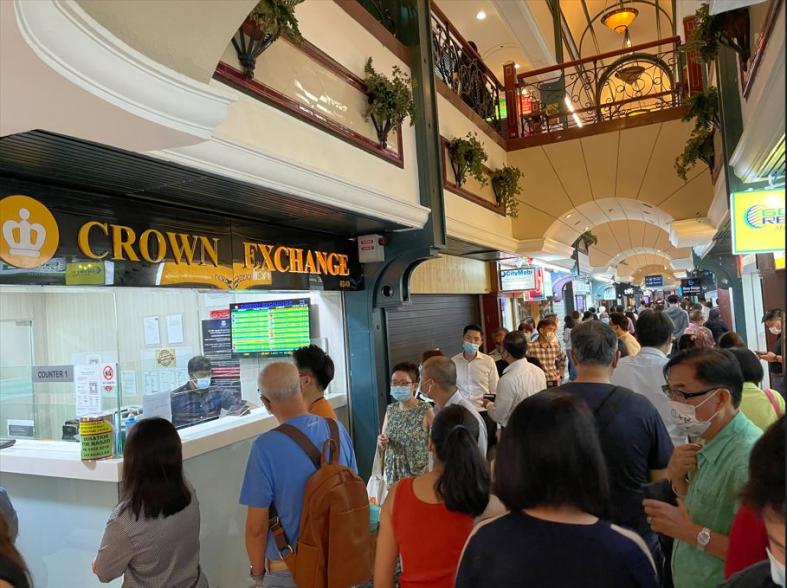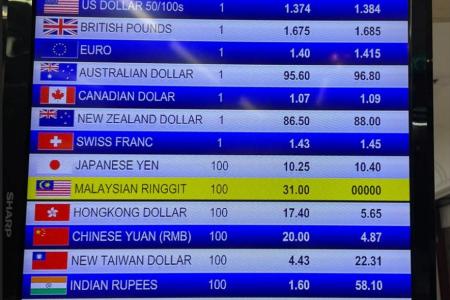Long queues to buy ringgit but some money changers just don’t sell
Money changers at The Arcade in Raffles Place had snaking queues of people waiting to buy Malaysian ringgit, which has dropped to record lows against the Singapore dollar, on Thursday (Aug 4).
The Singapore dollar is now at a record high of RM3.23 after starting the year at RM3.0857.
But not all the shops were selling the Malaysian currency.
Some of them had signs showing that their selling rate was 0, indicating they didn’t have any ringgit to sell.
But it’s not just a question of running out of the currency because of the high demand.
At least two money changers told TNP that they usually don't stock ringgit anymore, though they still buy from customers who walk in asking to change the currency to Singapore dollars.
Despite the higher volume of transactions, compared with currencies such as the Thai baht or the Vietnamese dong, they said they were frequently making losses on ringgit.
Mr San Kabeer, 50, owner of Universal Money Xpress, has stopped selling ringgit.
He said: “The long queues are difficult to manage as there are only two of us to run the store, and the profit margin is so low that it doesn’t make sense to continue selling.”
The owner of Hasan Trading Money Exchange, Mr Mohammed Ismail, 50, who runs his business alone, has also stopped dealing in ringgit, agreeing that the labour is not worth the insignificant profits.
Several money changers TNP spoke to also explained that with the ringgit falling almost daily, business is unstable and risky.
Money changers need to purchase ringgit stock beforehand, but the rate at which they have to sell often ends up lower than the rate at which they originally purchased the stock.
Mr Rahmed, 57, an employee of Golden Jinna, who wanted to be known by his last name, said: “You can only buy ringgit stock at this specific rate today, but if the rate decreases tomorrow you have no choice but to sell at that rate”.
He also said that his employer rarely stocks up on ringgit now, mostly selling only to other money changers at wholesale prices when they need to.
Apparently, this is mostly to clear stock.
“You’d have to be selling ringgit in the millions to make enough profit, the smaller money changers cannot compete,” Mr Rahmed added.
Mr Vanchilabbai Sharifdeen, 53, who owns VS Exchange, told TNP that for RM100,000 (S$30,947) sold, money changers earn no more than between $10 and $30.
He said: “In money changing, it doesn’t mean that when sales are high profits are high. It doesn’t work like that.”
He added that profit margins are even lower for those operating in The Arcade because of its oversaturated market and stiff competition, explaining why it offers what he described as some of the lowest exchange rates in Asia.
All of this only makes the queues even longer.

An employee of Dazzling Xchange, who declined to be named, said they sell out of ringgit daily, but have chosen to stock the currency in much lower amounts because of the low profit margin.
While she could not reveal exact numbers, she said: “To tell you honestly, sometimes we sell at a loss. But it’s still in demand, so making a bit of profit is better than nothing”.
Some Singaporeans have been taking this chance to stock up on ringgit, with Mr Sharifdeen saying one customer had exchanged $30,000 in one transaction.
But most people TNP spoke to were exchanging only $300 to $500 in preparation for road trips to Malaysia over the National Day long weekend.
Many of them use cards rather than cash when they are there.
Ms Hannah Chew, 26, who works in finance, is headed to Kuala Lumpur to visit relatives and said she will be spending only on “bare necessities”.
“My family usually uses credit cards in Malaysia, but I’m exchanging cash just in case,” she said.
Ms Jaz Ng, 27, who works in e-commerce, visits Johor Baru twice a month for cheaper facial treatments.
When asked if she is spending more with the better exchange rates, she said: “Just because the currency is good doesn’t mean I spend more. Inflation is also happening, so my spending habits have to stay the same.”
And she added that she also mainly relies on credit cards instead of cash.
Get The New Paper on your phone with the free TNP app. Download from the Apple App Store or Google Play Store now


